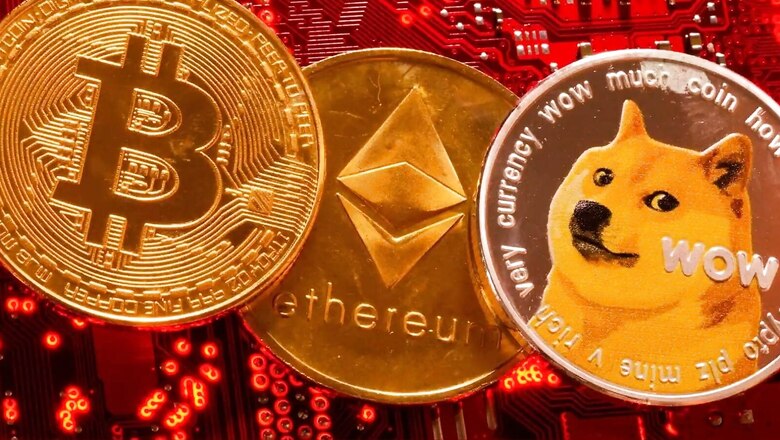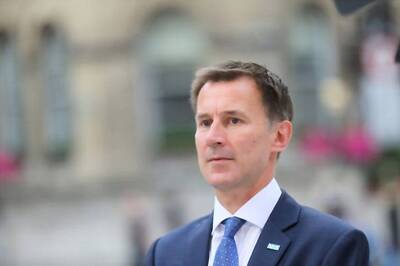
views
Although several countries have banned cryptocurrency, the decentralised money has become a mainstream component of the global financial system. This means that it will inevitably become a part of international conflict, for better or worse and as Russian armies enter Ukraine, this is on full show.
As the war with Russia rages on, Ukrainian officials urged netizens on Twitter to send cryptocurrency. Since then, according to reports, cryptocurrency investors have given the Ukrainian government and a foundation backing the country’s military, more than $22 million in digital assets.
The turmoil in Ukraine has brought the burgeoning industry under increased attention, with politicians and regulators concerned that the cryptocurrencies could be used by Russian firms and government officials to circumvent sanctions. However, as more traditional crowdfunding techniques face challenges, cryptocurrency has created a way for investors all across the world to quickly shift funds to Ukrainian soldiers.
In the case of crypto donations, Ukraine’s Vice Prime Minister Mykhailo Fedorov on February 26 shared wallet addresses on Twitter, urging people to “Stand with the people of Ukraine”, while adding that “now accepting cryptocurrency donations. Bitcoin, Ethereum and USDT”.
Later, in the same Twitter thread, he wrote: “The people of Ukraine fighting for our freedom are forever grateful to Gavin Wood @gavofyork for the generous donation of $5M of @Polkadot $DOT as promised publicly. Thank you from all of us here in Ukraine working for a peaceful future.”
As of now, some reports have claimed that Ukraine has received at least $11 million through anonymous Bitcoin donations.
Separately, Come Back Alive, a Kyiv-based organisation that raises funds to arm and train Ukrainian military men, had a page taken down by the crowdfunding platform Patreon, which stated that the page had broken its rules prohibiting support of military activities. But now the organisation is getting funds from a crypto collective called UkraineDAO, which was formed last week by some crypto enthusiasts.
According to a report it was said Come Back Alive had pledged to use the funds to provide medical assistance to war victims rather than armed soldiers.
Additionally, it was also reported that Since Kremlin launched its attacks on the neighbouring country, cryptocurrency donations to Ukrainian volunteer and hacktivists groups have increased dramatically.
Sam Bankman-Fried, the billionaire CEO of crypto exchange FTX US, revealed in a tweet that they had given $25 to each Ukrainian on their platform.
These activities highlight the fact that at this time of crisis, donors who might have otherwise given their money to huge charities have turned to cryptocurrencies as an alternative.
But in a separate scenario, cryptocurrency exchanges have refused Ukraine’s request to suspend all Russian accounts.
As reported recently, major cryptocurrency exchanges such as Coinbase and Binance have refused to comply with Ukraine’s request to freeze all Russian accounts, claiming that doing so would damage people and go against their values.
Russia, Crypto, And Conflict
Russia has already been sanctioned by several countries that have raised concerns in certain quarters that the Kremlin could utilise crypto to evade sanctions and shift money unnoticed.
The Russian government has been constructing a digital currency, according to early reports, and Russia has been developing tools to obscure the origins of digital transactions. So if sanctions are intended to prevent countries and corporations from doing business with Russia, crypto would be a means to circumvent them.
Understanding the scenario Ukraine had urged crypto and blockchain platforms to block the addresses of Russian users. But a cryptocurrency exchange has refused the request.
Major cryptocurrency exchanges such as Coinbase and Binance have refused to comply with Ukraine’s request to freeze all Russian accounts, claiming that doing so would damage people and go against their values.
Separately, the American government is also considering how it might sanction Russian cryptocurrency assets and has already advised cryptocurrency exchanges to guarantee that sanctioned Russian persons and organisations do not use their platforms.
Tangled Issues
But there are complications. While restricting Russia’s access to cryptocurrency might have serious consequences for the country, as the digital currency has grown in popularity in Russia, which is also the world’s third-largest bitcoin miner, in reality, it may not be possible.
Not all exchanges verify their customers’ identities, and it’s tough to trace the origins of cryptocurrency transactions in general. The legality of a cryptocurrency exchange’s compliance with sanctions may be determined by where it is registered and where it operates.
Russia also has a long history of involvement in crypto-related cybercrime and illegal activities like money laundering and ransomware. So cryptocurrency can also be used to raise funds for criminals.
According to reports, three-quarters of the money generated by ransomware assaults last year went to Russian-linked hackers. The Ukrainian government was targeted in January by a series of cyberattacks disguised as ransomware that demanded bitcoin before destroying data on government systems.
However, at this moment it is not known how cryptocurrencies will affect international conflict, or if it will help or cause more problems. But what is confirmed now is that all the digital currencies have become a significant part of global economies and it has become a part of the ongoing war.
Read all the Latest Business News and Breaking News here




















Comments
0 comment